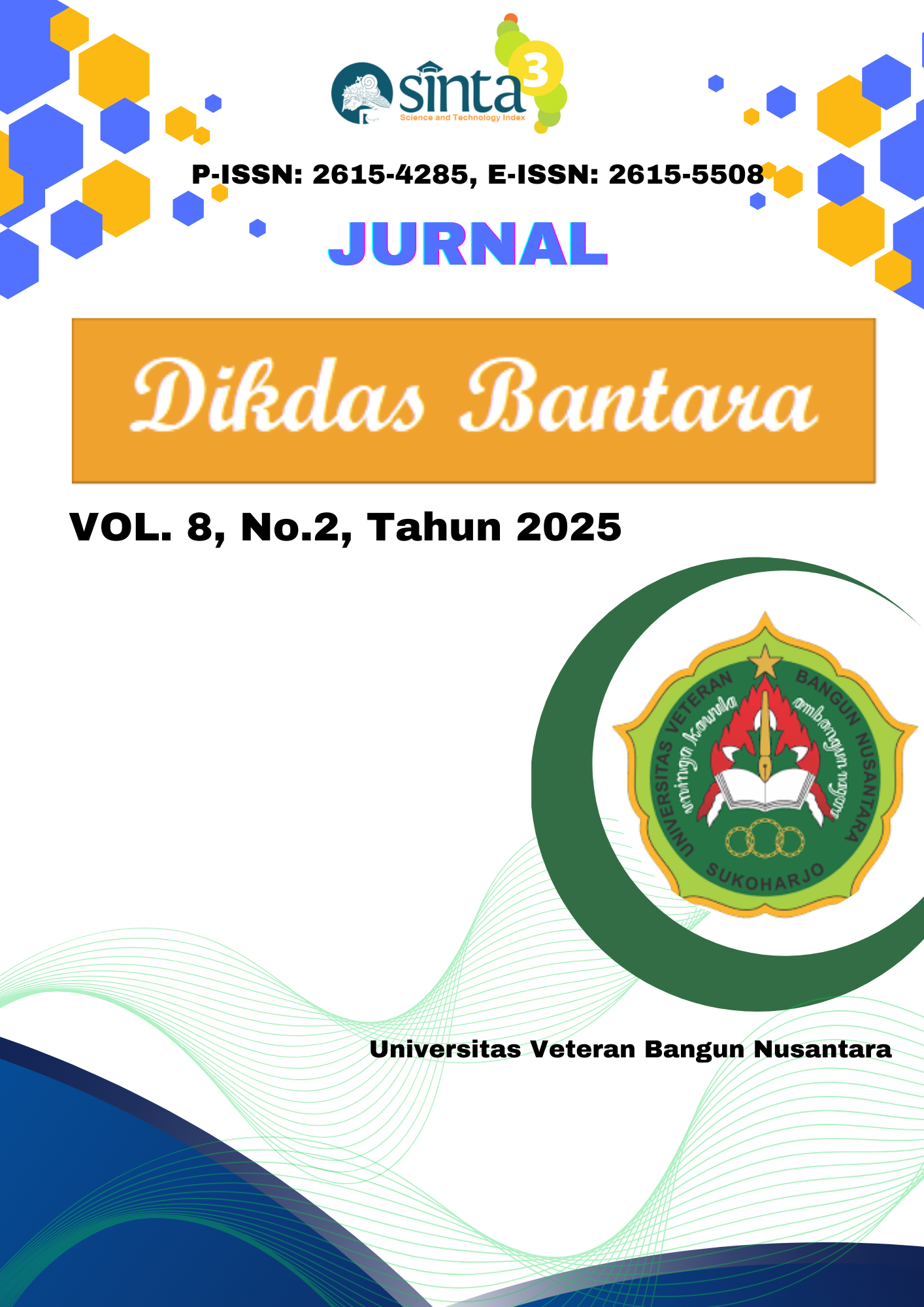THE EFFECT OF THE INQUIRY LEARNING MODEL ON SOCIAL SCIENCE LEARNING OUTCOME AND SAINS LITERACY IN GRADE IV STUDENTS OF ELEMENTARY SCHOOL CLUSTER IV AT BEBANDEM DISTRICT
DOI:
https://doi.org/10.32585/dikdasbantara.v8i2.7267Abstrak
The focus of this study is to discover how the inquiry learning approach affects science literacy and learning outcomes. The sample consisted of 55 persons chosen by random sampling techniques, while the research population included of 246 people. This study uses a posttest control group design and is quasi-experimental. An essay-style questionnaire measuring learning, motivation, data, and scientific critical thinking abilities was used to gather the study's data. The MANOVA statistical test was used to assess the data. With a F value of 39.457 and a significance level below 0.05, the results of this study show that: 1) the inquiry learning approach has an impact on the scientific learning outcomes of grade IV students at Elementary School Cluster IV, Bebandem District. 2) With a F value of 31.107 and a significance level below 0.05, the inquiry learning model has an impact on the science literacy of grade IV students at Elementary School Cluster IV, Bebandem District. 3) There is an influence of the inquiry learning model on the science learning outcomes and science literacy of grade IV students of Elementary School Cluster IV, Bebandem District. These results are evidenced by the F value of 32.903 with a significance of less than 0.05. This study provides empirical evidence regarding the effectiveness of the inquiry learning model on science learning outcomes and science literacy at the elementary school level.
Unduhan
Unduhan
Diterbitkan
Terbitan
Bagian
Lisensi
Hak Cipta (c) 2025 I Wayan Agus Giri Aditya Pratama, I Gede Suwindia , Luh Gede Handriani

Artikel ini berlisensiCreative Commons Attribution-ShareAlike 4.0 International License.
The copyright to this article is transferred to Jurnal DIKDAS BANTARA if and when the article is accepted for publication under Creative Commons Attribution-ShareAlike 4.0 International License. The undersigned hereby transfers any and all rights in and to the paper including without limitation all copyrights to Jurnal Komunikasi Pendidikan. The undersigned hereby represents and warrants that the paper is original and that he/she is the author of the paper, except for material that is clearly identified as to its original source, with permission notices from the copyright owners where required. The undersigned represents that he/she has the power and authority to make and execute this assignment.
We declare that:
1. This paper has not been published in the same form elsewhere.
2. It will not be submitted anywhere else for publication prior to acceptance/rejection by this Journal.
3. A copyright permission is obtained for materials published elsewhere and which require this permission for reproduction.
Furthermore, I/We hereby transfer the unlimited rights of publication of the above mentioned paper in whole to Jurnal Komunikasi Pendidikan. The copyright transfer covers the right to reproduce and distribute the article, including reprints, translations, photographic reproductions, microform, electronic form (offline, online) or any other reproductions of similar nature. The corresponding author signs for and accepts responsibility for releasing this material on behalf of any and all co-authors. After submission of this agreement signed by the corresponding author, changes of authorship or in the order of the authors listed will not be accepted.
Retained Rights/Terms and Conditions
1. Authors retain all proprietary rights in any process, procedure, or article of manufacture described in the work.
2. Authors may reproduce or authorize others to reproduce the work or derivative works for the author’s personal use or for company use, provided that the source and the Jurnal Komunikasi Pendidikan copyright notice are indicated, the copies are not used in any way that implies Jurnal Komunikasi Pendidikan endorsement of a product or service of any employer, and the copies themselves are not offered for sale.
3. Although authors are permitted to re-use all or portions of the work in other works, this does not include granting third-party requests for reprinting, republishing, or other types of re-use.












